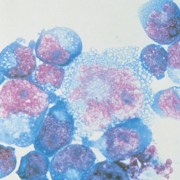 Photo: Getty Images
Photo: Getty Images
HIV stands for the human immunodeficiency virus. Having HIV can lead to having AIDS, but HIV is not the same as AIDS.
A virus is an infectious particle that is so small it can’t be seen even through a basic microscope. No virus is able to reproduce on its own. It can only multiply by infecting and taking over a host cell.
When a virus encounters a cell that can function as a host, it injects its own genetic material into the host cell. This causes the infected cell to produce more viral protein and genetic material instead of producing its own genetic code.
There are two types of HIV known as HIV-1 and HIV-2. In the United States, HIV typically refers to HIV-1 unless otherwise noted.
The HIV virus acts by infecting and killing cells in the human immune system known as CD4+T cells. CD4+ cells are one type of white blood cell that act as the body’s main infection fighting cells.
Without these cells, the immune system loses its ability to protect the body from infections, which makes it more likely that a person with HIV can get sick.
When the HIV virus takes over a CD4+ cell, that cell stops working as part of the immune system and is not able to reproduce to create any more CD4+ cells. Instead, the CD4+ cell reproduces the genetic material from the virus and sends it back out in to the body to infect more host cells.
This allows the virus to multiply and eventually damage enough CD4+ cells that the immune system is not able to do its job, leaving the body at higher risk for infections.
HIV starts damaging the immune system as soon as it enters the body. Some people may have symptoms similar to the flu within a few weeks of being infected with HIV.
These symptoms can last one to two weeks before going away. Other people do not have any symptoms shortly after becoming infected.
It is possible for someone with HIV to look and feel healthy for several years. But the damage to the immune system is on-going during this time.
Whether or not symptoms are present, any person infected with HIV should get regular health checkups. There is no cure for HIV, but there are medications available to slow the progression of the disease.
Doctors can track the infection by counting the number of CD4+ cells in a small amount of blood. If the number of these cells becomes too low, treatment such as antibiotics may be needed to help the body fight off infections.
HIV is a sexually transmitted disease. The virus can be shared through body fluids including blood, semen, or vaginal secretions. Unprotected sex, especially anal sex, is the primary way HIV is transmitted.
It is also possible to become infected by sharing drug needles. HIV can be passed from an infected woman to her child during pregnancy, childbirth, or breastfeeding.
Sources:
Centers for Disease Control and Prevention. Basic Information about HIV and AIDS. Web. October 2, 2011.
http://www.cdc.gov/hiv/topics/basic/index.htm
Mayo Clinic. HIV/AIDS. Web. October 2, 2011.
http://www.mayoclinic.com/health/hiv-aids/DS00005
University of California Museum of Paleontology. Introduction to the Viruses. Web. October 2, 2011.
http://www.ucmp.berkeley.edu/alllife/virus.html
About.com: AIDS/HIV. What are CD4 Cells?. Mark Cichocki, RN. Web. October 2, 2011.
http://aids.about.com/od/newlydiagnosed/qt/cd4.htm
About.com: AIDS/HIV. What is HIV and How Does it Relate to AIDS?. Mark Cichocki, RN. Web. October 2, 2011.
http://aids.about.com/od/aidsfactsheets/a/whathiv.htm
University of California San Francisco. HIV. Web. October 2, 2011.
http://www.ucsfhealth.org/conditions/hiv/
AVERT. HIV Structure and Life Cycle. Web. October 2, 2011.
http://www.avert.org/hiv-virus.htm
Reviewed October 4, 2011
by Michele Blacksberg RN
Edited by Jody Smith






Add a CommentComments
There are no comments yet. Be the first one and get the conversation started!